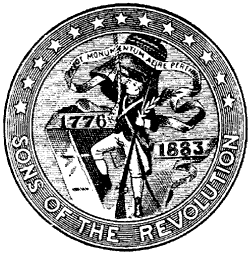
1797~1997
Canton Historical
Society
1400 Washington Street
Canton, Massachusetts 02021

1797~1997


May’s Tavern Landmark of the Revolutionary War
During the days of the American Revolution, Canton was a popular resting place for travelers using the road from Boston to Providence. One of the favorite of the local cases was May's Tavern.
Located at the southeast corner of Washington and Pleasant Streets, the old tavern lay in the path of the best route to Boston, until the new turnpike was laid out, early in the nineteenth century. In the front of the bilding there existed a huge well, which stretched some sixty feet into the ground. Before the days of the Aqueduct Company, this popular well was used by the entire neighborhood. From it, a tremendous trough carried refreshment to thirsty horses.
Long after the final traces of the old tavern had disappeared from the local scene, its site was still marked by a large blackheart cherry tree. So, too, was the famous well, in later years covered by a great flat stone, pinpointed by catalpa trees which had originally been brought from Georgia.
The history of the May's Tavern is mingled with just the right amount of fact an lore. As early as 1740, Samuel May is said to have erected a tiny shop on the same location. Five years earlier, Nathaniel May was fined for traveling on the Sabbath.
In October, 1766, it is reported that the Selectmen dined at the old landmark. Five of them paid for their meal at five shillings per man. Four of them however preferred their "boles of tody" to a homespun meal.
At about the same time, Joseph Billings was fortunate enough to have killed fifty-eight rattlesnakes. Overjoyed at his good fortune, Mr. Billings invited his dear friend , Mr. Joseph Hewins, to dine with him at May's Tavern.
Few were the guests of the Tavern who did not enjoy a bit of "flip" during their visits. The native concoction had achieved a reputation which had spread beyond the boundaries of Canton. Delicious, in spite of its questionable ingredients, the drink consisted of four pounds of sugar, four eggs, and one pint of cream. This mixture was thoroughly beaten and allowed to stand for two days.
Once the aging period was over, eager customers could watch as the innkeeper drew nearly a full quart of beer, added four teaspoons of the fermented brew, applied the heated loggerhead to each mug and capped his artistry with a gill of rum.
And the lazy, peaceful days of pre-war America came to an end, so, too, did the peaceful atmosphere of May's Tavern. The inn met with no decline in popularity. On the contrary, the tavern, at the time owned by Nathaniel May, was named by Captain Endicott as the meeting place for the minuteman of Canton. The Selectmen also continued to rendezvous at the old tavern, but their conversations no longer pertained to the contents of the larder or the recipes for their favorite beverages.
Even troops from towns beyond the boundaries of Canton, headed for the simmering town of Boston, began to spend the evenings at May's Tavern. Night after night, the bedrooms completely filled, every floor was filled with the sleeping forms of young recruits. And so it continued at May's Tavern until the termination of the Revolutionary War.

Boys as well as men involved in Revolution
It has been so long since the United States has experienced a war taking place on its own soil that a glimpse into Huntoon's description of the impact on Canton (then Stoughton) of the first Revolutionary War hostilities is very revealing. It is not difficult to imagine how we ourselves would feel if a similar situation occurred today. Huntoon's writing is unusually vivid in the following paragraph:
"The first notice that the people of ancient Stoughton received that hostilities had actually begun between the king's troops and the patriots, was on the afternoon of the 19th of April, 1775. It was lecture-day, and Parson Dunbar was exhorting his people and preparing them for the next Sunday's service, when suddenly the door was thrown open and Henry Bailey marched up the broad aisle and said there was an alarm. In an instant, all was confusion. A small boy, Lemuel Bent, seized the bell-rope, and soon the jangle reached of the neighboring farmer. Israel Bailey conversed for a moment with Capt. James Endicott, and then the captain said, "Take my colt that is fastened outside, ride through the town, and warn the company to meet at May's Tavern with arms and ammunition ready to march toward Boston at a moment's notice. Captain Endicott returned to his home, obtained his announcements, and started down the road to Boston, leaving his company to follow as they could be collected."
These minute-men marched directly to the coast, and their fellow townsmen followed them with provisions and supplies.
One of the best suppliers of the volunteer company was Captain Endicott's son John, who, in 1775, was twelve years old. On April 20th he started out with a supply of food but when he reached Roxbury he learned that his father had been ordered in the direction of Cambridge. He continued his journey until he found the encampment at Prospect Hill, showing a sense of responsibility that earned him other assignments during the war. He went sometimes as far as Hartford and Norwich, Connecticut, a remarkable feat for a youngster. Since all the able-bodied men were in the service, boys had to become men fast in these troubled days.
An example of the type of travel hazards John encountered was a trip to Boston in the winter of 1780 when he was sixteen years old. The roads were obstructed with snow and the cold intense but he started out with his ox-team loaded with wood. The Neponset River was frozen fast s he drove his team onto it, entering at Milton Mills, and followed the course of the stream to Boston Harbor, crossing over the harbor near William Castle, later Fort Independence, to enter Boston.
He left the wood and started back to Canton with a load of damaged gunpowder he picked up in Cambridge so that it could be worked over in the powder-mill. "On his return over the Neck," according to Huntoon, "such was the condition of the road that he repeatedly overset - four times, he said - and was obliged to re-load. He reached Roxbury near midnight, where he stayed until next morning".

![]()